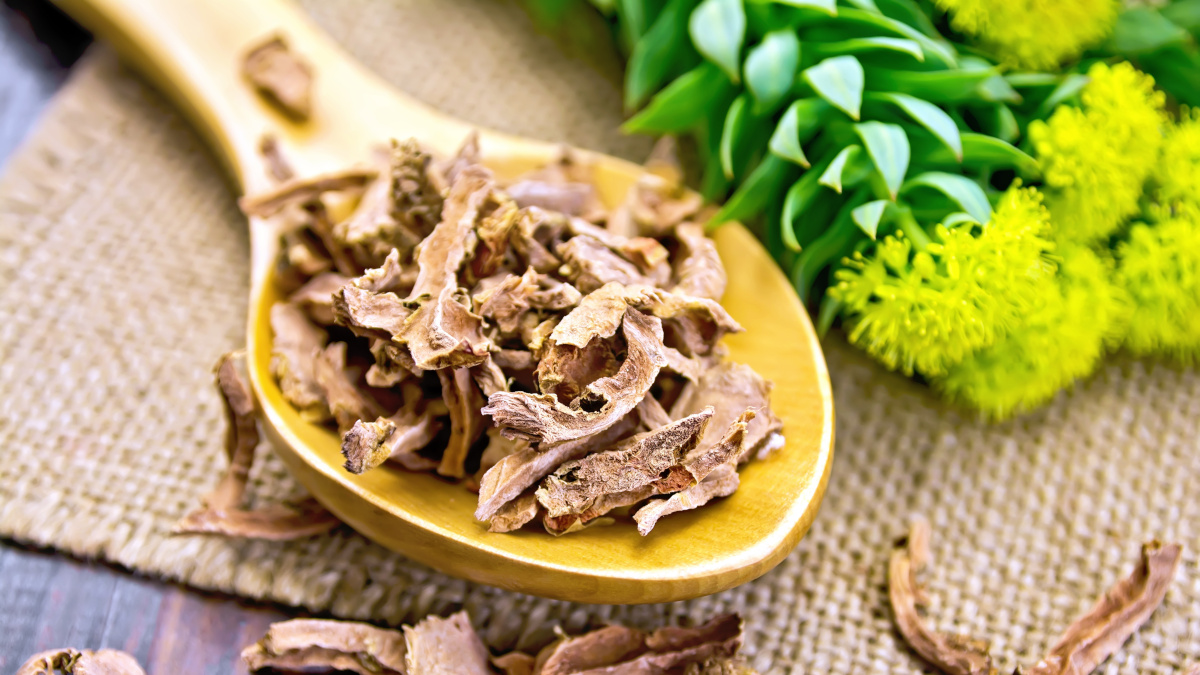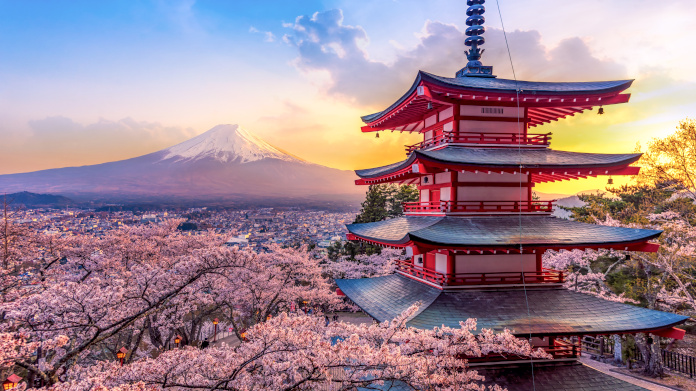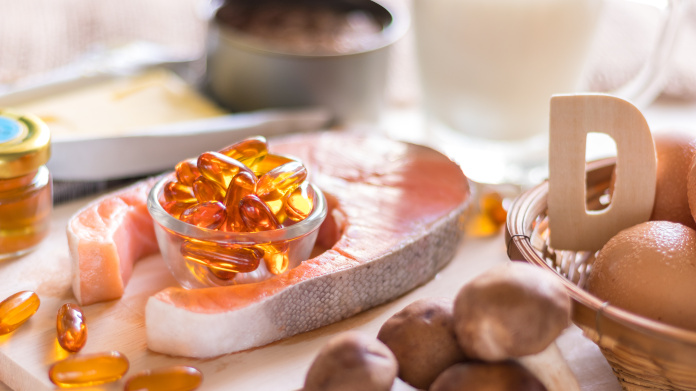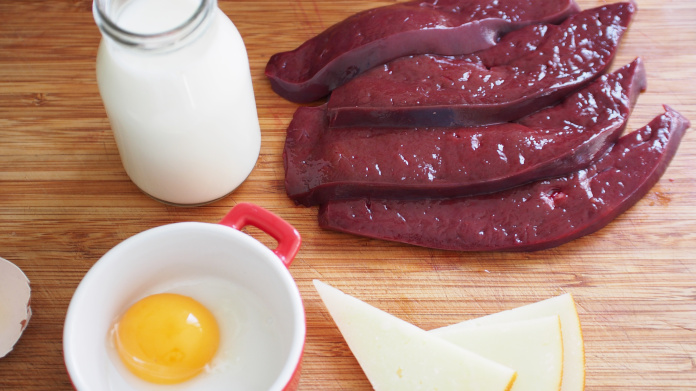
Rhodiola: benefits and dosage of the famous ‘golden root’
An adaptogen plant used for centuries by those living in cold climates, rhodiola offers many advantages for health. Discover now the benefits of this arctic root, a plant of significant scientific interest.
What exactly is Rhodiola rosea?
Rhodiola rosea, also known as simply rhodiola, roseroot, golden root and arctic root, is a perennial plant indigenous to the world’s colder regions. It thus grows in the Arctic, in mountainous areas of central Asia and in Northern Europe.
It has traditionally been used by the Vikings, Inuits, and Sami (or Laplanders)... as well as by practitioners of Chinese medicine.
Composition of the ‘arctic root’ or ‘golden root’
Rhodiola contains various active ingredients, including in particular:
- rhodiolosides, glycoside compounds;
- tyrosol, a phenolic substance;
- and the famous rosavins, responsible for many of the plant’s properties (1).
It also contains flavonoids, essential amino acids and a number of minerals and vitamins.
The only part of the rhodiola plant which is consumed and used in phytotherapy is the root (hence its alternative names of ‘golden root’ and ‘arctic root’). A number of scientists have now succeeded in identifying its beneficial properties.
Multiple benefits of the adaptogen Rhodiola rosea
Rhodiola:
- supports strength and physical condition (2);
- helps the body adapt to emotional stress and is thus classified as an adaptogen». It has shown positive effects against fatigue and stress-induced headaches (3-4);
- has a beneficial effect on the cardiovascular system, as it helps protect against stress and hypertension (5);
- helps maintain normal circulation which is associated with healthy brain function and reactivity. It thus supports optimal mental and cognitive activity and helps stimulate perception (6);
- has been shown to help those with sleep problems. Taking a rhodiola supplement may thus be beneficial for those who have trouble falling asleep ... (7);
- rhodiola is also a plant antioxidant which helps protect cells(8).
Dosage: how much rhodiola should you take a day?
This arctic root can be taken in the form of a herbal tea or decoction, in which case consume 300-550 mg a day, spread over 3 cups a day, for a period of one week, followed by a week’s break.
However, the simplest way to consume rhodiola is to take pre-dosed capsules, which avoids the risk of taking too much. Choose a supplement such as Rhodiola rosea, which provides 600 mg of Rhodiola rosea a day, standardised to 5% rosavin. For maximum benefit, take one capsule before breakfast, and one before lunch.
Other supplements that contain Rhodiola rosea
If you’d like to benefit from several adaptogen plants at the same time, opt for a synergistic formulation (such as Adaptix, which contains Rhodiola rosea, astragalus, schisandra...)
If you’re feeling stressed, you could also try the formulation Adrenal Support. Along with rhodiola, it contains tulsi which helps protect against the effects of stress, and eleutherococcus, another excellent adaptogen.
Do you spend hourstossing and turning in bed? Do you wake up constantly during the night and get up each morning feeling increasingly tired? As well as containing Rhodiola rosea, the supplement Natural Sleep Formula has a high hop and valerian content, which helps promote good quality sleep.
Caution: rhodiola is not recommended for women who are pregnant or breastfeeding, or for those suffering from kidney disease or cirrhosis.
References
- Li Y, Pham V, Bui M, et al. Rhodiola rosea L.: an herb with anti-stress, anti-aging, and immunostimulating properties for cancer chemoprevention. Curr Pharmacol Rep. 2017;3(6):384-395. doi:10.1007/s40495-017-0106-1,
- Parisi A, Tranchita E, Duranti G, Ciminelli E, Quaranta F, Ceci R, Cerulli C, Borrione P, Sabatini S. Effects of chronic Rhodiola Rosea supplementation on sport performance and antioxidant capacity in trained male: preliminary results. J Sports Med Phys Fitness. 2010 Mar;50(1):57-63. PMID: 20308973.
- Ishaque S, Shamseer L, Bukutu C, Vohra S. Rhodiola rosea for physical and mental fatigue: a systematic review. BMC Complement Altern Med. 2012;12:70. Published 2012 May 29. doi:10.1186/1472-6882-12-70
- Li Y, Pham V, Bui M, et al. Rhodiola rosea L.: an herb with anti-stress, anti-aging, and immunostimulating properties for cancer chemoprevention. Curr Pharmacol Rep. 2017;3(6):384-395. doi:10.1007/s40495-017-0106-1
- Maslova LV, Kondrat'ev BIu, Maslov LN, Lishmanov IuB. O kardioprotektornoĭ i antiadrenergicheskoĭ aktivnosti ékstrakta rodioly rozovoĭ pri stresse [The cardioprotective and antiadrenergic activity of an extract of Rhodiola rosea in stress]. Eksp Klin Farmakol. 1994 Nov-Dec;57(6):61-3. Russian. PMID: 7756969.
- Ma GP, Zheng Q, Xu MB, et al. Rhodiola rosea L. Improves Learning and Memory Function: Preclinical Evidence and Possible Mechanisms. Front Pharmacol. 2018;9:1415. Published 2018 Dec 4. doi:10.3389/fphar.2018.01415
- EFSA Register of Questions – 2659
- Battistelli M, De Sanctis R, De Bellis R, Cucchiarini L, Dachà M, Gobbi P. Rhodiola rosea as antioxidant in red blood cells: ultrastructural and hemolytic behaviour. Eur J Histochem. 2005 Jul-Sep;49(3):243-54. PMID: 16216810.
Keywords
3 Days
A good webshop for supplements
A good webshop for supplements, it has a large selection of them and considering the quality, the pricing offers good value for money. The ordering process is easy and the products are sent straight away.
Maurice
5 Days
Great quality
Products are of great quality and fast delivered.
Fred Laan
6 Days
SuperSmart destaca por la calidad de…
SuperSmart destaca por la calidad de sus productos.
GONZALEZ PALACIN Luis
7 Days
snelle levering,perfect product.
snelle levering,perfect product.
robert
7 Days
Been a customer for over 15 years and…
Been a customer for over 15 years and find their products along with the service excellent. I recommend Super Smart to all my friends.
Del Chandler
8 Days
Excellent product and service
The product was excellent and so were the delivery and the service
F. Ferlitz
10 Days
Never an issue ordering
Never an issue ordering. Simple and to the point. And product always comes the following day. Quality is great too!
Andrea
11 Days
Excellente service & products with rare…
Excellente service & products with rare revelation supplements I love ❤️
Giovanna Escalera
12 Days
Fast shipping
Fast shipping, products as ordered!
Coindozer
12 Days
The item arrived on time and is what…
The item arrived on time and is what was stated in the order.
HARDY Chris
15 Days
Very good products
Very good products. Very reliable. Quick delivery.
MIFSUD Joseph
19 Days
Fast shipping
Fast shipping, good products (just shipping costs to my country are extremely high).
Tanja Matko
20 Days
Many thanks.
Many thanks.
Alan
20 Days
Quick delivery and good product
Quick delivery and good product
cl
22 Days
Very quick delivery
Very quick delivery
Florica Maser


